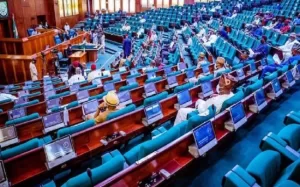The House of Representatives has called on the federal government to avoid imposing further economic burdens on Nigerians through unnecessary and multiple taxation.
This announcement comes alongside a three-week ultimatum issued for the Committees on Finance and the Federal Inland Revenue Service (FIRS) to identify and eliminate double taxation on low-income earners in the country.
Speaker of the House of Representatives, Rt. Hon. Tajudeen Abbas, set the deadline during a plenary session on Thursday, following the adoption of a motion concerning revenue generation and tax obligations amid rising inflation.
The motion was moved by Rep. Peter Aniekwe and co-sponsored by House Minority Leader, Rep. Kingsley Chinda, along with four other lawmakers.
This followed the adoption of a motion on urgent public importance moved by Rep. Peter Aniekwe and co-sponsored by the House Minority Leader, Rep. Kingsley Chinda and four others at the plenary on Thursday.
The motion was moved by Rep. Peter Aniekwe (LP-Anambra) and five other lawmakers.
Rep. Peter Aniekwe (LP-Anambra) highlighted the current economic challenges facing Nigeria, stating, “Nigeria’s economic situation is currently plagued by inflation, unemployment, and the increasing cost of living, resulting in widespread hardship among Nigerians.”
He pointed out that the imposition of multiple taxes, levies, and charges at various levels of government exacerbates the financial strain on citizens, particularly low-income earners.
He emphasised that the imposition of multiple taxes, levies, and charges at various levels of government places further financial strain on citizens, especially low-income earners.
READ ALSO: Nigeria’s Presidential Villa To Be Fully Digitalised By November, Says Perm Sec
The lawmaker also stressed that while the government’s primary responsibility was to meet the basic needs of the masses, it is expected to achieve this through policies that promote economic development, social welfare, and prosperity for citizens.
“Concerned that the introduction of additional and sometimes unnecessary taxes, including consumption taxes, service taxes, and levies on essential goods and services, places an undue burden on the masses, further widening the inequality gap.
“Mindful that while taxation is necessary for government revenue, a balance must be struck between revenue generation and the economic well-being of citizens, particularly at a time when many families and businesses are still recovering from the economic impact of global and local challenges.
“Alternative measures can be taken to increase government revenue without overburdening the masses, such as expanding the tax base, improving tax administration, reducing government waste, and curbing corruption,” he said.
The House of Representatives had urged the federal government to consider alternative revenue generation strategies instead of increasing taxes in the country.
The lawmakers further suggested widening the tax net to capture more high-income earners and strengthening the enforcement of existing tax laws.
The House also agreed that the government should explore increasing the export of cash crops and agricultural produce.
In his ruling, Abbas mandated the Committees on Finance and FIRS to conduct a thorough review of existing tax laws and policies within three weeks to streamline tax collection processes.
Part of their responsibilities would include identifying and eliminating overlapping taxes and areas of double taxation to provide relief to citizens without jeopardizing government revenue targets.
The House further urged the National Orientation Agency (NOA) and other relevant agencies to educate the public on their tax rights and responsibilities, and to report any cases of exploitation or unjust taxation to the ombudsman.


